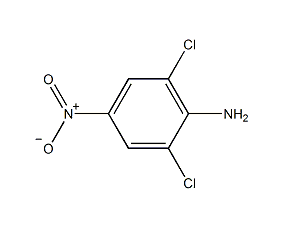2,6-Dichloro-4-nitroaniline 2,6-Dichloro-4-nitroaniline


Structural formula
| Business number | 02FK |
|---|---|
| Molecular formula | C6H4Cl2N2O2 |
| Molecular weight | 207.01 |
| label |
Alisan, Allisan,Bortran,Dichloran,Ditranil, Fungicide |
Numbering system
CAS number:99-30-9
MDL number:MFCD00007677
EINECS number:202-746-4
RTECS number:BX2975000
BRN number:1459581
PubChem number:24862145
Physical property data
1. Properties: Yellow needle-like crystals.
2. Density (g/mL, 20℃): Undetermined
3. Relative vapor density (g/mL, air=1): Undetermined
4. Melting point (ºC): 189~190
5. Boiling point (ºC, normal pressure): Undetermined
6. Boiling point (ºC, kPa): Undetermined
7. Refractive index: Undetermined
8. Flash point (ºC): Undetermined
9. Specific rotation (º): Undetermined
p>
10. Autoignition point or ignition temperature (ºC): Not determined
11. Vapor pressure (mmHg, 20.2ºC): Not determined
12. Saturated vapor Pressure (kPa, ºC): Undetermined
13. Heat of combustion (KJ/mol): Undetermined
14. Critical temperature (ºC): Undetermined
15. Critical pressure (KPa): Undetermined
16. Log value of oil-water (octanol/water) distribution coefficient: Undetermined
17. Explosion upper limit (%, V/V): Undetermined
18. Lower explosion limit (%, V/V): Undetermined
19. Solubility: Hardly soluble in water, easily soluble in ethanol, The solubility in acetone, chloroform, and ethyl acetate are 3.4%, 1.2%, and 1.9% respectively.
Toxicological data
Toxic, acute oral LD50 in mice: 3603mg/kg.
Ecological data
This substance is harmful to the environment, and special attention should be paid to the pollution of water bodies.
Molecular structure data
1. Molar refractive index: 46.82
2. Molar volume (cm3/mol): 127.4
3. Isotonic specific volume (90.2K ): 360.3
4. Surface tension (dyne/cm): 63.8
5. Dielectric constant:
6. Dipole moment (10-24cm3):
7. Polarizability: 18.56
Compute chemical data
1. Reference value for hydrophobic parameter calculation (XlogP): None
2. Number of hydrogen bond donors: 1
3. Number of hydrogen bond acceptors: 3
4. Number of rotatable chemical bonds: 0
5. Number of tautomers: none
6. Topological molecule polar surface area 71.8
7. Number of heavy atoms: 12
8. Surface charge: 0
9. Complexity: 173
10. IsotopesNumber of atoms: 0
11. Determine the number of atomic stereocenters: 0
12. Uncertain number of atomic stereocenters: 0
13. Determine chemical bonds Number of stereocenters: 0
14. Number of stereocenters of uncertain chemical bonds: 0
15. Number of covalent bond units: 1
Properties and stability
Avoid contact with strong oxidants, strong acids, acid anhydrides, and acid chlorides.
Operators should wear protective equipment.
Storage method
Store in a cool, ventilated warehouse. Keep away from fire and heat sources. Protect from direct sunlight. The packaging is sealed. They should be stored separately from oxidants, acids, acid anhydrides and acid chlorides, and avoid mixed storage. Equipped with the appropriate variety and quantity of fire equipment. Suitable materials should be available in the storage area to contain spills.
Synthesis method
There are mainly the following methods: chlorination of p-nitroaniline in hydrochloric acid-glacial acetic acid; chlorination of 2-sulfonate-4-nitroaniline; chlorination of p-nitroaniline in dilute hydrochloric acid and sodium hypochlorite; p-nitroaniline reacts in hydrogen peroxide and hydrochloric acid; p-nitroaniline is first sulfonated and then chlorinated in concentrated sulfuric acid; p-nitroaniline reacts with sodium chlorate in concentrated hydrochloric acid.
Purpose
Dye intermediates. Mainly used to produce disperse dyes such as dispersed yellow-brown 3GL, dispersed yellow-brown 2RFL, dispersed brown 3R, dispersed orange S-4RL, dispersed blue S-BBL, dispersed yellow-brown SE-4BR, dispersed yellow-brown H-2RL, and coloring powder 0 -11 and other dyes.